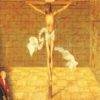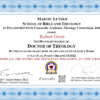Tag: Theology
Reflecting on Advanced Theology Degrees and a Theology of Glory
I know some tire of me opining on what has been called a ‘theology of glory’ (which is a negative thing), but for me it is seemingly something the Lord always has convicted me on ever since I started radically walking with him. This was of course a theme for Martin Luther who is known for his theology of the cross versus what he identifies as a theology of glory (that of the schoolmen). I believe, ultimately, the Apostle Paul is really the greatest advocate for living a life in the theology of the cross (which of course includes resurrection and ascension). In light…
What is History According to Barth’s Theology?: On the Covenant of Grace
Theology ultimately should be a very concrete thing, at least for the Protestant Christian. We are people of the Word of God; we are people who have been radically brought into the life of God by a deep sense of the theology of God’s Word as that has confronted us in the face of a man from Nazareth. It is this Word-grounded reality upon which we, then, as Christians think a God-world / world-God relation; that is, through the analogy of the hypostatic union, of the Theanthropos Godman, Jesus Christ. And it is as we have come to know this…
John Calvin’s Theology of the Cross as Theological Theology
Staying on theme from the previous post, let’s continue to focus on the theologia crucis; except this time it won’t be Luther’s, but John Calvin’s. Karl Barth in his Church Dogmatics III/1 refers us to the foreword Calvin wrote for his Commentary on the Book of Genesis (1554). Herein Calvin offers something that sounds intimately close to Luther’s thinking on a theology of the cross. So Calvin: indeed it is vain for any to philosophize in the manner of the world, unless they have first been humbled by the preaching of the gospel, and have instructed the whole compass of…
Calvin in Barth’s Services on an ‘analogy of relation’ against Natural Theology and Her ‘Resourcers’ in scholasticism Reformed
Knowledge of God is the key, that is to the ‘secret of creation.’ If “Jesus Christ is indeed the real ground of creation,”[1] then in order to know what in fact creation is for, we must first know its Creator. But as Karl Barth underscores, in a rather Athanasian key, if Jesus is the ground of creation, and if Jesus is indeed the ‘Son of the Father,’ then to know the inner-ground, the secret of creation is first to know Jesus, to know the Son. As such, prior to knowing what and who creation is for, as the case may…
So What?! What Does All This Jargony Theology Have to do with Real Life?: A Personal Sketch
So what? What’s all this high falutin theologically jargony theology have to do with anything? I get to this point more times than not. Even though I often engage high theological notions, and attempt to reflect therein, at the end of it I often walk away with the “so what!” feeling. Many Christians take one look at the themes I write on, others write on, that the dead theologians have written on, and simply shake their heads figuring, at best, this is all for the eggheads among us. But I really don’t think that that is the case, or that…
On Being a New PhD student in Theology
I am now a PhD student “beginning” (in scare quotes, because I’ve been studying said subject matter since 2002 in earnest) research on a doctrine of grace in what I am calling the Protestant Church Fathers juxtaposed with the grace-ologies of Thomas Torrance and Karl Barth. I am somewhat riffing on this topic of research from TFT’s own PhD dissertation entitled A Doctrine of Grace in the Apostolic Fathers. I am finally undertaking this venture of study through the Concordia Academic Theology Consortium: Martin Luther School of Bible and Theology; the same institution (of the General Lutheran Church) that recently awarded me with…
A Doctor of Theology
I have had contact with Dr. Enrique Ramos for quite a few years via Facebook. He just recently reached out to me and out of the blue said he and the institution he represents (along with the Sub-Director of that institution, Dr. Fred Macharia) had an award they wanted to confer upon me. He said they both were thankful and appreciative for the work I have been doing with our edited books on Evangelical Calvinism, along with the furtherance of that through my other writings (here etc). He asked me what my legal given name was, I wasn’t sure why….
“Christian Theology” as an Insecurity
The thought occurred to me last night that much of the theological developments over the last many centuries, particularly during and post-mediaeval times stem from personal insecurities. Ludwig Feuerbach famously made the observation that ‘theology is anthropology,’ that it is the self’s projection of its self-perceived notion of virtuousness and greatness. Here’s an anonymous description taken from an anonymous source: “Feuerbach claimed that our conceptions of “god” are always just projections of our own values. God fulfills our need to objectify our virtues, and embodies our values. Thus the essence of religion is human nature, and our Gods tell us about ourselves…”theology…
Does Theology Perfect Philosophy? Barth’s Nein / Przywara’s Ja
Kenneth Oakes’ book Karl Barth on Philosophy and Theology, which I reviewed a few years ago for the blog, presses the same point that Keith Johnson does in his book Karl Barth and the Analogia Entis. The point is the way Barth sees the relationship between philosophy and theology; he doesn’t, not in the way that post-mediaeval classical theism does in its effort to synthesize so-called faith-and-reason. This is one of the primary factors that has drawn me to Barth over the years. His prolegomenon is conditioned solely by what he considers to be both the formal and material principle…








